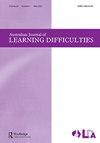语言理解是否支持困难读者的解码技能?
IF 1.6
Q3 EDUCATION, SPECIAL
引用次数: 2
摘要
摘要本研究调查了语言理解对困难读者解码技能的贡献。参与者是36名年龄在8-12岁之间的儿童,他们的解码能力都低于平均水平,但语言理解能力不同。孩子们阅读了《阅读能力精细分析》中的段落,他们的前25个错误被分为句法、语义、音位和笔迹相似性。儿童首先根据较高和较低的语言理解水平进行分组。对失误的分析表明,各组之间在失误相似性方面没有差异。然后根据假名阅读技巧对他们进行分组。除语义相似外,各组在所有混杂类型上均存在显著差异。一项使用多元回归的误传分析表明,在考虑年龄后,假名阅读是误传质量的最佳预测因素。除此之外,语言理解对歧义的句法相似性也有一定的促进作用。本文章由计算机程序翻译,如有差异,请以英文原文为准。
Does linguistic comprehension support the decoding skills of struggling readers?
Abstract This study investigated the contribution of linguistic comprehension to the decoding skills of struggling readers. Participants were 36 children aged between eight and 12 years, all below average in decoding but differing in linguistic comprehension. The children read passages from the Neale Analysis of Reading Ability and their first 25 miscues were categorised into syntactic, semantic, phonemic, and graphophonic similarity. Children were first grouped in terms of higher and lower linguistic comprehension levels. Analysis of miscues showed no differences between the groups in miscue similarity. They were then grouped according to pseudoword reading skill. There were significant differences between the groups for all miscue types except semantic similarity. An analysis of miscues using multiple regression showed that, after taking account of age, pseudoword reading was the best predictor of quality of miscues. In addition, linguistic comprehension contributed to syntactic similarity of miscues over and above decoding.
求助全文
通过发布文献求助,成功后即可免费获取论文全文。
去求助
来源期刊

Australian Journal of Learning Difficulties
EDUCATION, SPECIAL-
CiteScore
1.80
自引率
11.10%
发文量
8
 求助内容:
求助内容: 应助结果提醒方式:
应助结果提醒方式:


